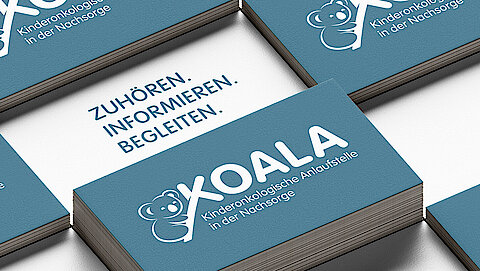In Germany, around 2,200 children and adolescents are diagnosed with cancer every year. This diagnosis suddenly changes the life of the affected child or adolescent, their family, and their social environment. Long hospital stays, isolation, invasive surgeries, chemotherapy, and radiation can leave a mark—not just physically but also mentally. After finishing intensive therapy, life is supposed to go back to normal, but often, it isn’t the same as before the diagnosis.
At KOALA, families get support as they transition into follow-up care and their new everyday life, so they don’t have to go through this alone. With individual guidance, support, and coordination, the focus is on:
- Returning to "normal" life
- Long-term coping with the disease
- Personal life and future plans
Right from the moment of diagnosis, KOALA is there as a constant support system, ready to help when new needs, questions, or challenges come up.
As a non-clinical support center, we offer a safe space where we focus on specific psychosocial needs. How the support looks—its form, intensity, and duration—is completely based on the needs and wishes of the person seeking help. It can be a one-time consultation, targeted support, or a structured follow-up program.
For whom is KOALA intended?
- Children and adolescents finishing intensive cancer treatment
- Young adults who had cancer before the age of 18
- Parents, siblings, other family members, and people from their social circle
What topics do we cover?
- Accepting and coping with illness Late effects and long-term consequences
- Kindergarten and school
- Vocational training and work
- Siblings
- Rehabilitation and therapy options
These are just examples—we take every concern seriously and approach each situation individually.
What Does Support at KOALA Look Like?
No matter what the request is, we offer time, expertise, and our network to help. We don’t just provide one-time answers, but also long-term support that can start at any point—even shortly after diagnosis, for example, for siblings or friends of the affected child.
Support happens through appointments and discussions, where the main focus is on personal support and identifying possible solutions. Since every person’s needs and challenges are different, the support might involve areas like:
- Social life and relationships
- Kindergarten and school
- Training and work
If a conversation shows that more support is needed, we arrange follow-up appointments.
How does support work?
- In-person meetings at our center
- Phone consultations
- Home visits in special cases
- Outreach to kindergartens, schools, training centers, or other institutions
How does the structured follow-up program work?
Even though we focus on individual support, our structured follow-up program follows a standardized approach to ensure continuous care and support.
Here’s how the program works:
- Getting in touch and signing up
- Contact can happen by phone or email.
- A registration form (available for download) collects basic information about the child or adolescent and their situation.
- An initial consultation is scheduled.
- First meeting
- The goal is to build trust and get to know each other.
- The registration form is discussed, and a standardized psychosocial needs assessment is done.
- Documentation and evaluation
- KOALA staff document and analyze the conversation.
- If specific needs are identified, first recommendations can be made (e.g., referrals to specialists, existing follow-up programs, etc.).
- All information is put together in a follow-up report, which is given to the family in writing.
- Discussion of results and next steps
- The report is discussed with the family in a follow-up meeting.
- Any further steps, possibilities, or questions are clarified.
- Regular follow-up appointments
- After 6 months and after 1 year, follow-up meetings take place to reassess the situation and current needs.
- Reports are written after each meeting to ensure continuous documentation and support.
- Long-term check-ins
- Families receive regular but less frequent check-ins (e.g., yearly).
- This helps maintain a trusting relationship and keeps support available as needed.
Support is always available when needed. Even outside scheduled check-ins, families can reach out anytime if new problems or concerns come up. Joining the structured follow-up program is voluntary and can be done at any time, even after multiple contacts.
Why a structured approach matters. The standardized follow-up process allows us to scientifically track and improve psychosocial care. This is crucial for ensuring that support continues to evolve and meet the needs of patients and families.
Our goal: support for every family during and after treatment. In the future, we want every affected child and family to have access to our follow-up program when transitioning from treatment to recovery. Families who are already in follow-up care are also welcome to join at any time.
Wie kann ich mich anmelden?
Wie sind wir zu erreichen?
Adresse: Cranachstraße 56, 45147 Essen
Telefon: 0201 74 94 96 25
E-Mail: koala@kinderkrebsnetzwerk.de
Die Kontaktaufnahme kann auch anonym erfolgen.
KOALA ist ein kostenfreies Angebot.
